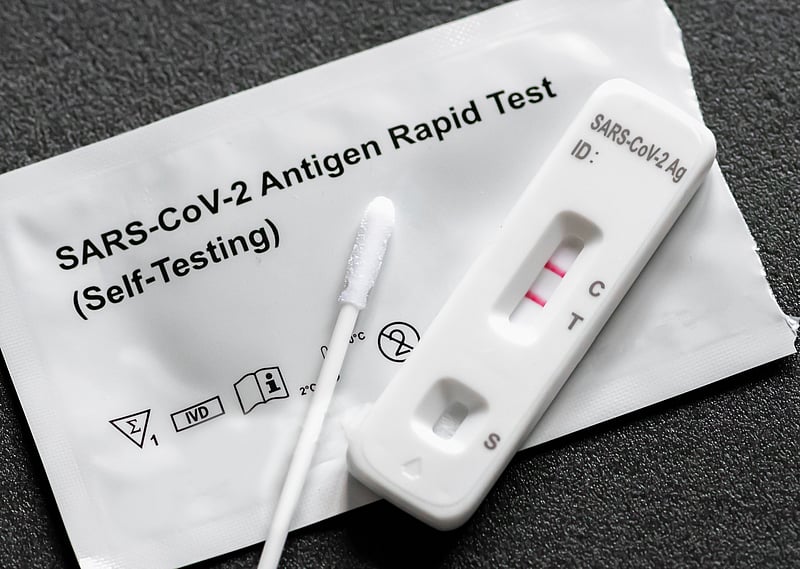Get Healthy!

- Dennis Thompson
- Posted February 17, 2023
Prior COVID Infection Brings Strong, Long-Lasting Immunity: Study
Natural immunity acquired from a COVID infection provides strong and lasting protection against severe illness if a person becomes reinfected, a new evidence review has concluded.
Ten months after a COVID infection, protection against hospitalization and death remains at 89% for Omicron and 90% for earlier variants, according to pooled data from 65 studies conducted in 19 countries.
However, protection against reinfection wanes quickly with Omicron, which is the dominant COVID strain at this time, researchers found.
After 10 months, a previous case of Omicron provides only 36% protection against a follow-up COVID infection, researchers reported Feb. 16 in The Lancet.
The analysis suggests that the level and duration of protection derived from COVID infection is at least on a par with that provided by two doses of the mRNA vaccines developed by Moderna and Pfizer-BioNTech, researchers said.
"These findings are not surprising as multiple studies have shown that prior infection confers protection against severe disease, though it may not confer protection against infection in the Omicron era,"said Dr. Amesh Adalja, a senior scholar with the Johns Hopkins Center for Health Security in Baltimore. He was not involved in the research.
But because people first infected with the coronavirus run the risk of hospitalization, death and long COVID, researchers concluded that vaccination remains the overall best form of protection against COVID.
"The vaccines and boosters are still the safest way to acquire immunity, mainly for those who are in high-risk populations,"said study co-author Caroline Stein, a postdoctoral researcher at the University of Washington's Institute for Health Metrics and Evaluation.
In fact, the best protection now appears to come from "hybrid immunity,"the combination of an actual infection and vaccination, said Dr. William Schaffner, medical director of the Bethesda, Md.-based National Foundation for Infectious Diseases.
"The data are really coming through that that provides the most solid and the longest lasting protection, and that's going to be something that most of us have experienced,"said Schaffner, who wasn't part of the study. "Most of us have been vaccinated, and many of us have had COVID infection and recovered. That puts us in reasonably good shape going forward."
The pooled data showed that prior to Omicron, a COVID infection provided strong and lasting protection against both reinfection and severe illness from a follow-up infection.
The protection from reinfection conferred by pre-Omicron strains started at 85% in the first month and declined slightly to about 79% at 10 months.
Unfortunately, the higher contagiousness of the Omicron variants upended that protection.
"The risk of reinfection starts quite reasonable, like 76% at the first month, but up to 10 months it drops to 36%"following an Omicron infection, said co-author Dr. Hasan Nassereldine, a postdoctoral researcher also at the Institute for Health Metrics and Evaluation.
The good news: Protection against hospitalization and death remained around 90% for both the earlier strains as well as Omicron.
The researchers concluded that natural immunity should be taken into account when testing, approving and scheduling future COVID vaccines and boosters.
Adalja agreed.
"While vaccination is the safest way to gain protection against severe disease, this data should, ideally, inform vaccine policy for those with prior infection in terms of primary vaccination and booster frequency,"he said.
"There was an opportunity lost earlier in the vaccine program when a one-size-fits-all approach was used in those with or without prior infection when data suggested that perhaps a single dose of vaccine would be sufficient in those with prior infection,"Adalja continued. "Hopefully, future vaccine policy will adhere more to precision medicine."
Schaffner doesn't hold that view, given that a complicated vaccine regimen can cause confusion and lead people to not bother with boosters.
"We'll have to see whether down the road the vaccination recommendations are going to be pretty much the same for everybody or they're going to try to segment the population such that people at higher risk get more frequent boosters,"Schaffner said. "My hope is that we finally wind up doing it the former way -- in other words, everybody's in the same category because that's simply easier to communicate, easier to understand and, I think, easier to accept."
More information
The U.S. Centers for Disease Control and Prevention has more on COVID vaccines.
SOURCES: Amesh Adalja, MD, senior scholar, Johns Hopkins Center for Health Security, Baltimore; Caroline Stein, PhD, postdoctoral researcher, Institute for Health Metrics and Evaluation, University of Washington, Seattle; William Schaffner, MD, medical director, National Foundation for Infectious Diseases, Bethesda, Md.; Hasan Nassereldine, MD, postdoctoral researcher, Institute for Health Metrics and Evaluation, University of Washington, Seattle; The Lancet, Feb. 16, 2023, online







